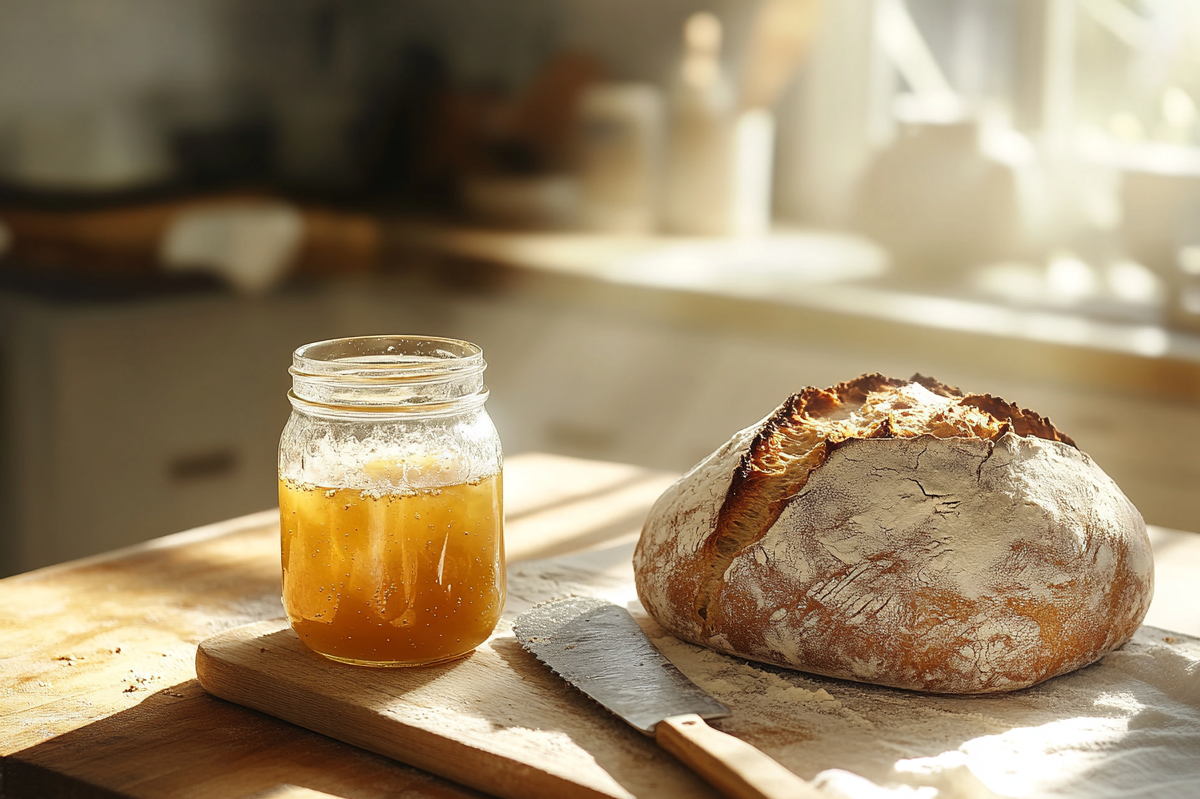Introduction
When you make sourdough, one of the by-products is sourdough discard. This by-product comes from the portion of the sourdough starter that you remove during feeding to make room for new flour and water. While it might seem like waste, many bakers and home cooks incorporate sourdough discard into various recipes. But does sourdough discard offer any health benefits? This article explores whether sourdough discard can make your recipes healthier by improving gut health and lowering the glycemic index.
What is Sourdough Discard and Its Health Benefits?
Sourdough discard is the excess starter that you remove to maintain a healthy balance of bacteria and yeast in the sourdough starter. Although it might sound like something you should throw away, discard still contains live cultures, nutrients, and some of the beneficial properties found in fully developed sourdough starter.
Sourdough Discard Recipes: Delicious Ways to Reduce Waste explains how you can use sourdough discard and why it’s important not to waste it.
Nutritional Composition of Sourdough Discard and Its Impact on Health
Despite being a by-product, sourdough discard remains rich in several nutrients:
- Probiotics: These beneficial bacteria support gut health and digestion.
- Vitamins and Minerals: Sourdough discard contains nutrients like B vitamins, iron, and folate.
- Lower Glycemic Index: The fermentation process reduces the glycemic index of grains, making sourdough discard a better option for blood sugar management.
According to How to Add Sourdough Discard to Any Recipe, the probiotics and other beneficial components in sourdough discard contribute to a healthier gut microbiome, making it a valuable ingredient in various recipes.
Common Uses of Sourdough Discard for Healthier Recipes
Instead of throwing away sourdough discard, many people find ways to incorporate it into their cooking and baking. Here are some common uses:
- Pancakes and Waffles: The discard adds a unique tangy flavor.
- Crackers: A great way to make crispy snacks.
- Biscuits: Using sourdough discard in biscuits enhances the flavor and nutritional profile.
For more ideas on how to use sourdough discard, check out What Can I Use My Sourdough Discard For?.
Comparing Sourdough Discard Health Benefits with Active Sourdough
While both sourdough discard and active sourdough share similar health benefits, some differences exist:
- Nutritional Density: Active sourdough, which undergoes full fermentation, may have slightly higher levels of probiotics and a more complex nutrient profile.
- Fermentation Time: The shorter fermentation time of discard might not neutralize as much phytic acid as fully fermented sourdough, but it still offers substantial benefits.
Potential Downsides of Sourdough Discard and Health Considerations
While sourdough discard is generally beneficial, you should consider a few things:
- Phytic Acid: Some of the phytic acid present in grains may not fully neutralize, which could inhibit nutrient absorption.
- Gluten Sensitivity: Although fermentation reduces gluten levels, individuals with severe gluten sensitivity or celiac disease should still be cautious.
FAQs on Sourdough Discard Health Benefits
- Does sourdough discard have the same gut health benefits as sourdough bread?
- Sourdough discard offers gut health benefits due to its probiotic content, but fully fermented sourdough may have more active cultures.
- Can I use sourdough discard if I am gluten intolerant?
- It depends on the level of gluten intolerance. While discard has lower gluten levels than regular flour, it may still contain enough to cause issues in those with severe gluten intolerance.
- How should I store sourdough discard to retain its health benefits?
- Store sourdough discard in an airtight container in the refrigerator. You can keep it for up to a week, though its flavor and potency will decrease over time.
- Is it safe to eat sourdough discard that has been stored for a long time?
- It is generally safe, but the longer you store it, the more it may lose its nutritional benefits and flavor.
- How does sourdough discard affect blood sugar levels compared to regular bread?
- Sourdough discard has a lower glycemic index than regular bread, making it a better choice for managing blood sugar levels.
Conclusion on Sourdough Discard Health Benefits
In conclusion, sourdough discard offers several health benefits, including improved gut health, a lower glycemic index, and a rich nutrient profile. While it may not be as nutrient-dense as fully fermented sourdough, it is still a valuable and healthy ingredient that should not be wasted. Whether you’re making pancakes, biscuits, or crackers, sourdough discard can make your meals healthier and more delicious.






